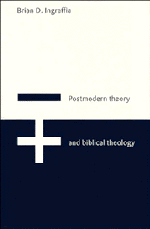Book contents
- Frontmatter
- Contents
- Acknowledgements
- List of abbreviations
- Note on translations of the Bible
- Introduction: postmodernism, ontotheology, and Christianity
- 1 NIETZSCHE'S MOCKERY: THE REJECTION OF TRANSCENDENCE
- II HEIDEGGER'S FORGETTING: THE SECULARIZATION OF BIBLICAL ANTHROPOLOGY
- III DERRIDA'S DENIALS: THE DECONSTRUCTION OF ONTOTHEOLOGY
- 11 From the ends of man to the beginnings of writing
- 12 Deconstituting the subject
- 13 Writing and metaphysics
- 14 Reading the law: the Spirit and the letter
- 15 Scripture or écriture: the limitations of Derrida's deconstruction of ontotheology
- Conclusion: ontotheology, negative theology, and the theology of the cross
- Notes
- Bibliography
- Index
13 - Writing and metaphysics
Published online by Cambridge University Press: 01 June 2011
- Frontmatter
- Contents
- Acknowledgements
- List of abbreviations
- Note on translations of the Bible
- Introduction: postmodernism, ontotheology, and Christianity
- 1 NIETZSCHE'S MOCKERY: THE REJECTION OF TRANSCENDENCE
- II HEIDEGGER'S FORGETTING: THE SECULARIZATION OF BIBLICAL ANTHROPOLOGY
- III DERRIDA'S DENIALS: THE DECONSTRUCTION OF ONTOTHEOLOGY
- 11 From the ends of man to the beginnings of writing
- 12 Deconstituting the subject
- 13 Writing and metaphysics
- 14 Reading the law: the Spirit and the letter
- 15 Scripture or écriture: the limitations of Derrida's deconstruction of ontotheology
- Conclusion: ontotheology, negative theology, and the theology of the cross
- Notes
- Bibliography
- Index
Summary
[T]he history of (the only) metaphysics, which has, in spite of all differences, not only from Plato to Hegel (even including Leibniz) but also, beyond these apparent limits, from the pre- Socratics to Heidegger, always assigned the origin of truth in general to the logos: the history of truth, of the truth of truth, has always been – except for a metaphysical diversion that we shall have to explain – the debasement of writing, and its repression outside “full” speech.
Derrida, Of GrammatologyHaving deconstructed the subject of metaphysics through a meditation on the sign, Derrida next turns, in Of Grammatology, to the treatment of writing in metaphysics. According to Derrida, just as Husserl had tried to exclude from consciousness the need for signs, to exclude sensible signifiers from expression, so does the whole of metaphysics, from the pre-Socratics to Heidegger, exclude writing from the realm of truth. Metaphysics does this by debasing writing, making it a mere inscription of already present meaning and truth. Like the sign in his analysis of Husserl, “the treatment accorded to writing” is regarded as “a particularly revelatory symptom” (Pos 7).
In the first part of Of Grammatology, Derrida sets his deconstructive method and its results in its broadest context. In his own words: “The first part of this book, ‘Writing before the Letter,’ sketches in broad outlines a theoretical matrix. It indicates certain significant historical moments, and proposes certain critical concepts” (OG lxxxix).
- Type
- Chapter
- Information
- Postmodern Theory and Biblical TheologyVanquishing God's Shadow, pp. 186 - 194Publisher: Cambridge University PressPrint publication year: 1995



